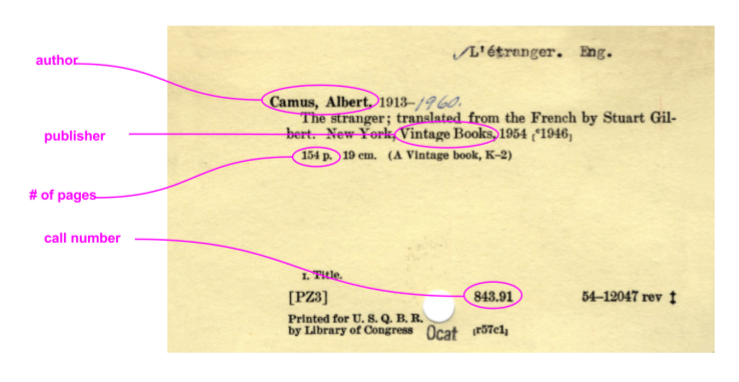
Metadata is “data about data”. In other words, metadata is information that describes one or more aspects of data. It makes working with data easier, and it allows machines to interpret and display data. One example of metadata is the catalog card, which was used to locate books in a library prior to the creation of digital catalogs. From the catalog card below, we can learn over a dozen data points about the one book represented by the card: its title, author, the author’s lifespan, the original language of publication, the translator, the publisher and year of publication, the number of pages, the physical size of the book, and its call number (or location in the library). We can even surmise that this catalog card was created before 1960, since Camus’ death date is written in by hand.

As humans, we are able to interpret these different data points, and understand their relative significance and meaning. For a computer to interpret this catalog card, it is necessary for the data to be structured and tagged. For digital library catalog to function, the book’s title must be indicated as the title; publisher as the publisher, and number of pages as the number of pages, and so forth. In libraries and archives, this is often accomplished through standards such as the Standard Generalized Markup Language or XML. Furthermore, different metadata standards and vocabularies are used to ensure that resources are being described in similar ways by different people and at different institutions. Commonly used metadata standards include MARC and Dublin Core (which will be familiar to users of Omeka). A vocabulary that all library users will have encountered is Library of Congress Subject Headings (LCSH), which is used to indicate the subject matter of items in library catalogs.

Metadata standards and vocabularies allow digital catalogs to return appropriate results to library users. However, these standards reflect the biases of both the creators of these standards, and how they are applied to individual resources. LCSH, which are used across the United States and around the world, are an excellent example. In 1980, the subject heading, or topical term, “Aliens, Illegal” was established by the Library of Congress to describe materials on the topic of unauthorized immigration. This term reflected a longstanding nativist framing of immigrants as both illegal, and fundamentally “alien” to the American body politic.[1]
In 2014, Dartmouth University students and staff submitted an official proposal to the Library of Congress to change the subject heading; two years later the Library announced the term would be replaced with “noncitizens” and/or “unauthorized immigration”. Shortly after this announcement, the House of Representatives ordered the Library of Congress to continue using the term “illegal aliens” (this was the first time Congress intervened in a LCSH change). Many libraries individually opted to stop using this term, which remained in official usage until 2021. The current subject heading is “illegal immigration,” thus only partial resolving the demands of librarians and student activists. You can learn more about the campaign to change this subject heading by watching the documentary Change the Subject or reading the thesis of Grad Center librarian Silvia Cho on this topic.
More recently, librarians and their allies have successfully advocated to add new subject headings pertaining to the historical existence of Palestine, including “Palestine question (to 1948),” which was largely unrecognized within the LCSH prior to 2023.
[1] Ngai, Mae M. Impossible Subjects: Illegal Aliens and the Making of Modern America. Princeton: University Press, 2004.



